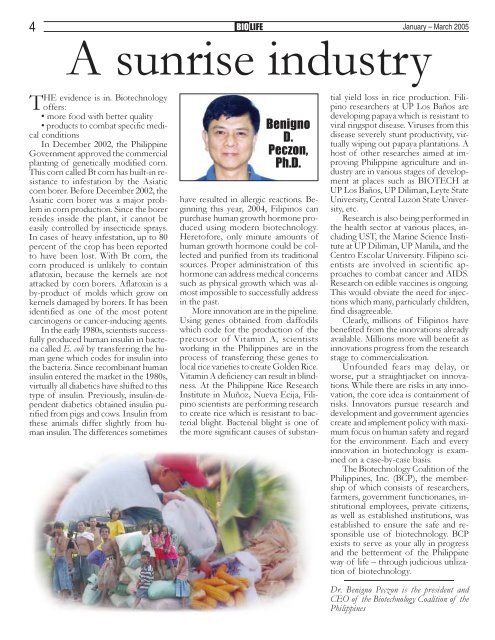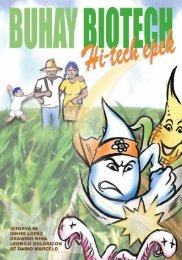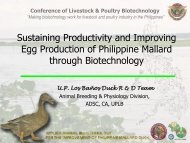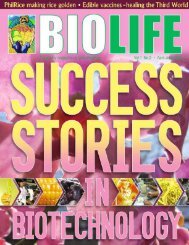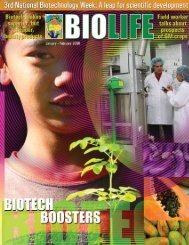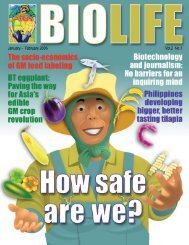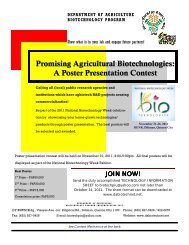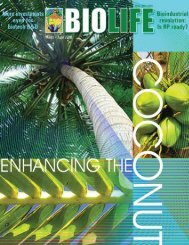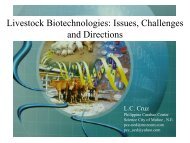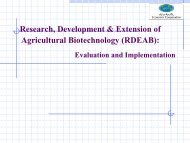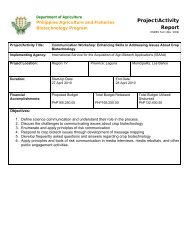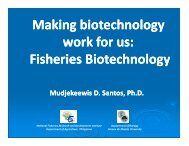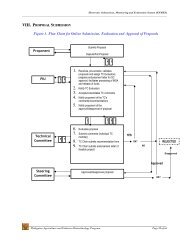Download PDF - SEARCA Biotechnology Information Center
Download PDF - SEARCA Biotechnology Information Center
Download PDF - SEARCA Biotechnology Information Center
You also want an ePaper? Increase the reach of your titles
YUMPU automatically turns print PDFs into web optimized ePapers that Google loves.
4 BIO LIFE January – March 2005<br />
A sunrise industry<br />
THE evidence is in. <strong>Biotechnology</strong><br />
offers:<br />
• more food with better quality<br />
• products to combat specific medical<br />
conditions<br />
In December 2002, the Philippine<br />
Government approved the commercial<br />
planting of genetically modified corn.<br />
This corn called Bt corn has built-in resistance<br />
to infestation by the Asiatic<br />
corn borer. Before December 2002, the<br />
Asiatic corn borer was a major problem<br />
in corn production. Since the borer<br />
resides inside the plant, it cannot be<br />
easily controlled by insecticide sprays.<br />
In cases of heavy infestation, up to 80<br />
percent of the crop has been reported<br />
to have been lost. With Bt corn, the<br />
corn produced is unlikely to contain<br />
aflatoxin, because the kernels are not<br />
attacked by corn borers. Aflatoxin is a<br />
by-product of molds which grow on<br />
kernels damaged by borers. It has been<br />
identified as one of the most potent<br />
carcinogens or cancer-inducing agents.<br />
In the early 1980s, scientists successfully<br />
produced human insulin in bacteria<br />
called E. coli by transferring the human<br />
gene which codes for insulin into<br />
the bacteria. Since recombinant human<br />
insulin entered the market in the 1980s,<br />
virtually all diabetics have shifted to this<br />
type of insulin. Previously, insulin-dependent<br />
diabetics obtained insulin purified<br />
from pigs and cows. Insulin from<br />
these animals differ slightly from human<br />
insulin. The differences sometimes<br />
Benigno<br />
D.<br />
Peczon,<br />
Ph.D.<br />
have resulted in allergic reactions. Beginning<br />
this year, 2004, Filipinos can<br />
purchase human growth hormone produced<br />
using modern biotechnology.<br />
Heretofore, only minute amounts of<br />
human growth hormone could be collected<br />
and purified from its traditional<br />
sources. Proper administration of this<br />
hormone can address medical concerns<br />
such as physical growth which was almost<br />
impossible to successfully address<br />
in the past.<br />
More innovation are in the pipeline.<br />
Using genes obtained from daffodils<br />
which code for the production of the<br />
precursor of Vitamin A, scientists<br />
working in the Philippines are in the<br />
process of transferring these genes to<br />
local rice varieties to create Golden Rice.<br />
Vitamin A deficiency can result in blindness.<br />
At the Philippine Rice Research<br />
Institute in Muñoz, Nueva Ecija, Filipino<br />
scientists are performing research<br />
to create rice which is resistant to bacterial<br />
blight. Bacterial blight is one of<br />
the more significant causes of substan-<br />
tial yield loss in rice production. Filipino<br />
researchers at UP Los Baños are<br />
developing papaya which is resistant to<br />
viral ringspot disease. Viruses from this<br />
disease severely stunt productivity, virtually<br />
wiping out papaya plantations. A<br />
host of other researches aimed at improving<br />
Philippine agriculture and industry<br />
are in various stages of development<br />
at places such as BIOTECH at<br />
UP Los Baños, UP Diliman, Leyte State<br />
University, Central Luzon State University,<br />
etc.<br />
Research is also being performed in<br />
the health sector at various places, including<br />
UST, the Marine Science Institute<br />
at UP Diliman, UP Manila, and the<br />
Centro Escolar University. Filipino scientists<br />
are involved in scientific approaches<br />
to combat cancer and AIDS.<br />
Research on edible vaccines is ongoing.<br />
This would obviate the need for injections<br />
which many, particularly children,<br />
find disagreeable.<br />
Clearly, millions of Filipinos have<br />
benefited from the innovations already<br />
available. Millions more will benefit as<br />
innovations progress from the research<br />
stage to commercialization.<br />
Unfounded fears may delay, or<br />
worse, put a straightjacket on innovations.<br />
While there are risks in any innovation,<br />
the core idea is containment of<br />
risks. Innovators pursue research and<br />
development and government agencies<br />
create and implement policy with maximum<br />
focus on human safety and regard<br />
for the environment. Each and every<br />
innovation in biotechnology is examined<br />
on a case-by-case basis.<br />
The <strong>Biotechnology</strong> Coalition of the<br />
Philippines, Inc. (BCP), the membership<br />
of which consists of researchers,<br />
farmers, government functionaries, institutional<br />
employees, private citizens,<br />
as well as established institutions, was<br />
established to ensure the safe and responsible<br />
use of biotechnology. BCP<br />
exists to serve as your ally in progress<br />
and the betterment of the Philippine<br />
way of life – through judicious utilization<br />
of biotechnology.<br />
Dr. Benigno Peczon is the president and<br />
CEO of the <strong>Biotechnology</strong> Coalition of the<br />
Philippines


